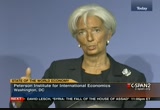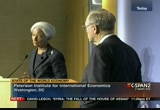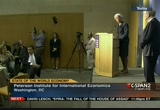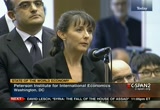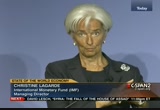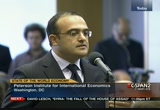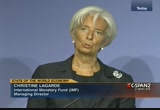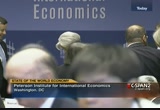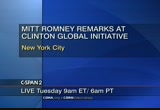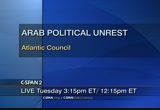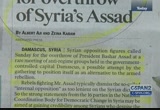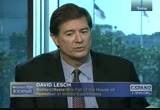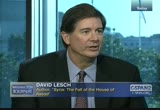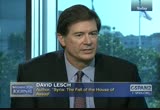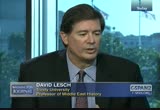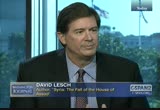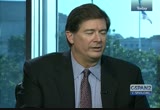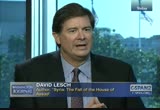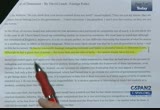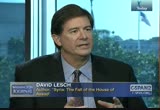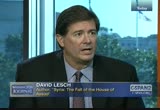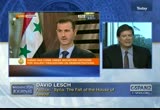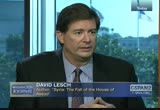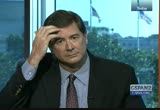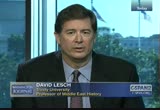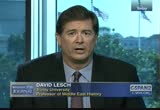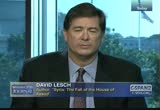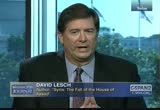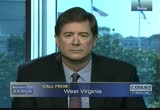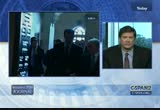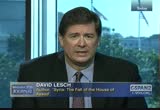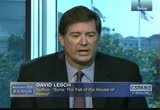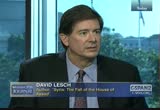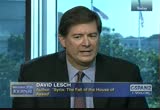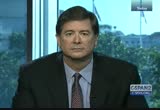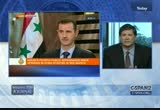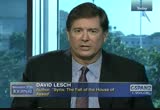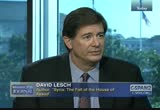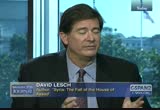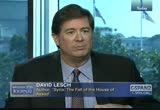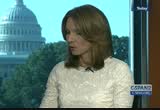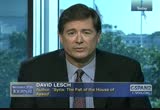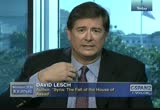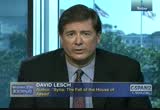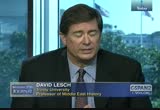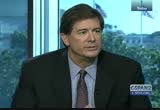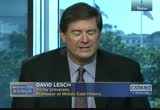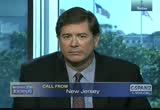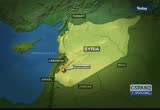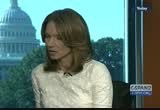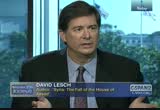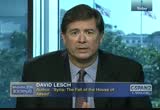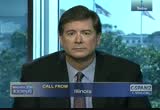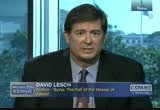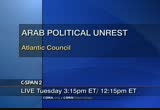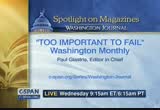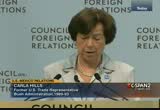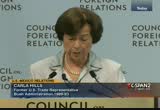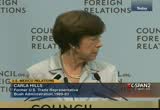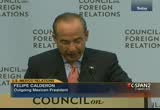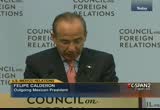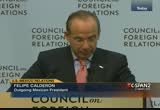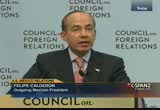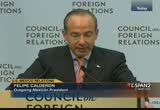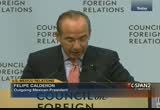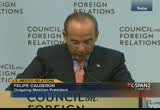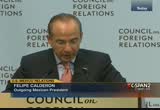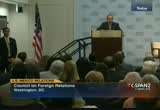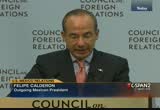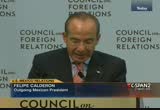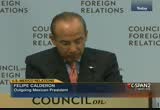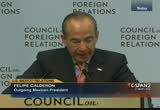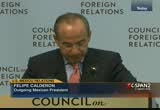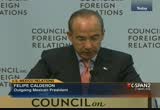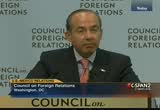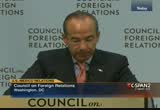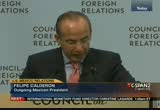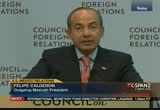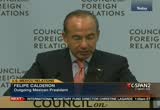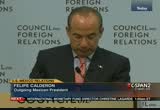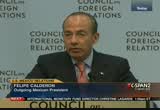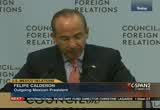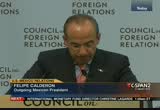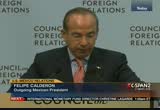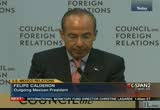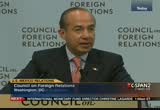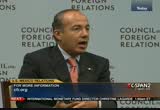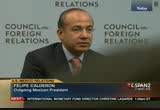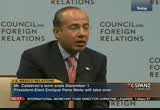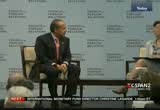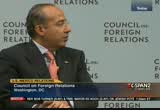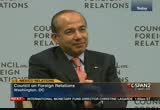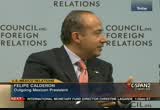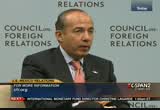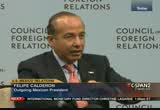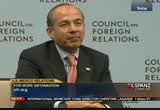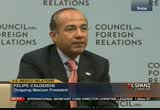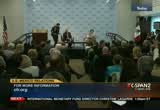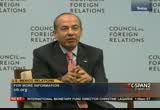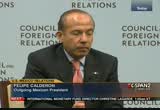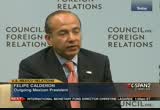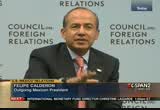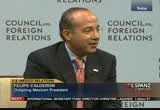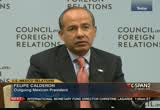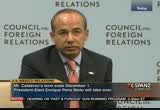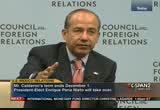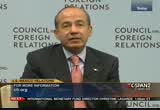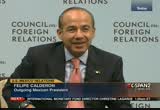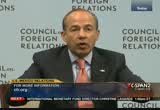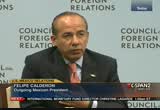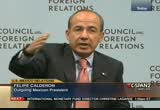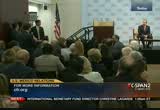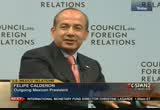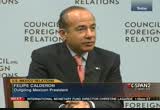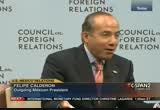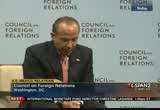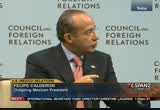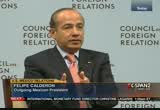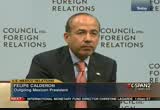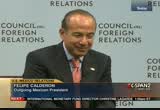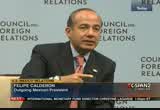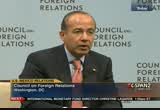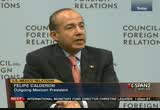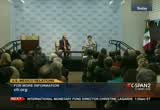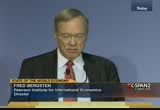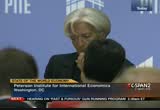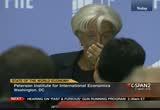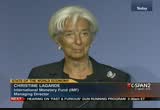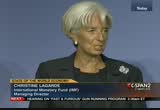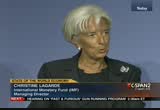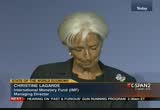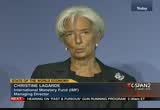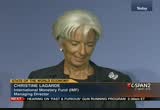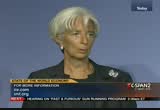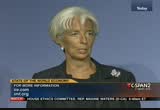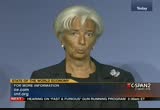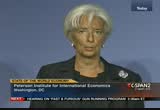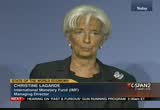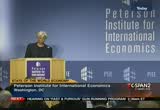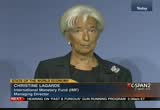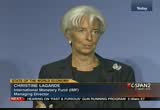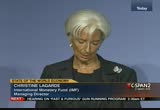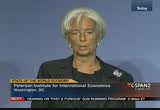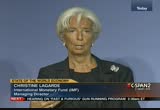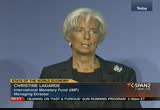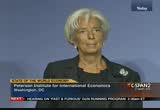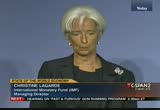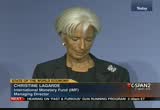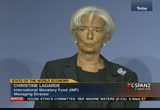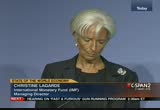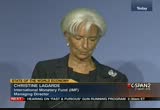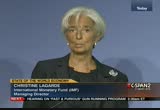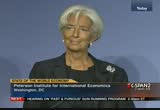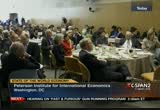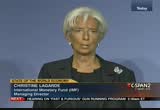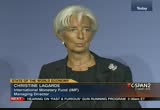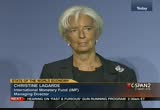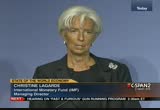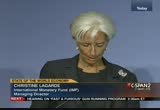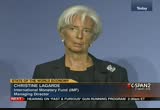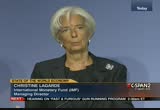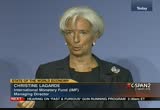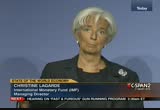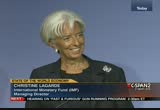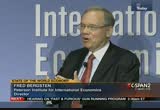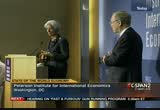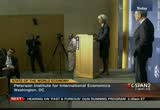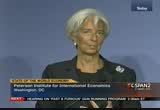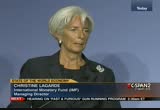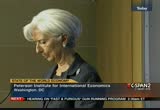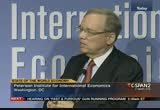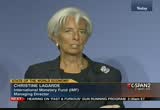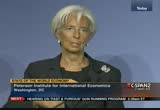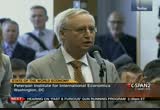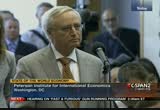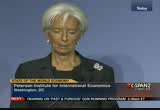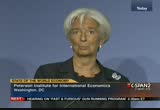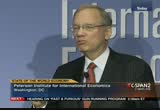tv Capital News Today CSPAN September 24, 2012 11:00pm-2:00am EDT
11:00 pm
11:01 pm
i know slightly different views than some studies seem to point to move shorter term than medium-term consequences. i think we are going to have at least into market, interest insults to watch and that will be the case in spain and that will be the case in italy, where both cases the labor market and the products and services market have been in the process of being reformed. but it is a tedious, cumbersome and complicated process because you may enact legislation on the one hand, that its impact on the judicial system and how the courts will apply the law and for a company to actually decide it is going to invest in such a country because the labor market is more flexible, maybe they're going to wait until they say whether the judicial system embarks on the same path i assemble not have very stringent
11:02 pm
case which will counterbalance the effect of the legislative reform. >> when you see medium-term, do you mean two years, theories, factors? >> i would say two or three years. >> okay, next. >> robert mathews, d.c. and. thank you, madam lagarde for beautiful exposition. there was another component that i an others might really appreciate the answer to. you have made a robust case for program extensions due to external exceptional circumstances in order to ensure that a program remains viable. you've also stated plainly today as it was a few weeks ago -- two weeks ago that we have to talk about the financing program and to speak plainly, that means haircuts, including official sector holders, life is potentially for the official sector holders, new money come
11:03 pm
either from the multilateral community such as the imf for individual creditors. i know you will not comment on negotiations currently under way, but i'm wondering if you could provide perspectives on how to think about that combination of solution or are there other potential components that are being menaced by the debate at the moment because there is a lot of concern and people go running off in one direction or another. if you can provide perspective on how you think about the passage of potential solutions that one could consider as promoting stability in the financial system. >> i think you are knowledgeable. clearly if much of comments. i'm not going to throw into the intricacies of how much more, how much less. it is important to keep in mind two things that i know which country you're referring to.
11:04 pm
the fiscal gap, the structural reforms, the financing of the programs, but also the sustainability of the country going forward so it can walk want premise to see that not always with a huge backup data on its back. it's a whole combination of matters that need to be addressed collectively by the members. >> thank you. >> this'll be the last question. >> i am from the brookings institution. thank you primus, not a chair for your hateful remarks. are they to draw draw your attention to the imt rocher mu mentioned before, which for the amounts about introduction of this new program, spanish yields have gone down, but this may just reflect the expect teixeira
11:05 pm
and that both or either of these countries may be approaching the european authorities and the imf. while there were some other analysts believing that these might, the effect of these might be a little bit more sustained. i would like just to ask you to elaborate if possible. thank you. >> you know, i'm not going to substitute members on their judgment and groups of players in the land which they are going to address issues. what i can see and i'm very pleased to see that a picture box that the europeans have in order to face hardship in significantly improved as a result of the decision announced by the european central bank. and that is clearly something that was expected, for which expectation was a rose by the announcement by the bank in
11:06 pm
london and the fact that the toolboxes they are coming soon capable of being operated, given that the esm will be operating asset the eighth of november in capital contributions will become a man. that in another self is a think a very strong message. >> menem managing director can we thank you for your remarks and wish you and your colleagues at the fun the best of success in dealing with all these daunting problems. we support it strongly and look forward to staying in close touch. thank you. [applause] [inaudible conversations]
11:09 pm
>> and returned to the situation in theory it here with david lesch, author of the new book, "syria: the fall of the house of assad." i actually met with bishara lessard, interviewed him many times as well as syrian officials fear professor of middle east history as well as trinity university, welcome to the table. thank you for being here. >> guest: thank you for having me. >> opposition calls for overthrow by sheer al-assad at a
11:10 pm
rare meeting of the entire machine groups held in the government controlled capital of damascus in an attempt at a gathering to position itself as an alternative to the armed rebels, citing the internal opposition on the syrian to cater. who are these people and what do you make of what they are saying? >> that's a good question. many fault lines in the syrian opposition. differences between the exiled syrian opposition a set of s-sierra, those fighting and dying on the ground in syria and those who are little more religious commission may come a arab opposition and those that are more secular opposition. and then you have those calling for the overthrow of the regime and those that are still blind to negotiate with the regime. there's been an attempt by outside powers, all these different groups of rebel forces to try to find a coherent center that can bring everything together in a coordinated way against the regime that would also draw outside support more
11:11 pm
readily as well as those fence sitters in the syrian population who don't necessarily support bashar al-assad regime, they don't see any viable alternative yet. once there is an alternative, some may go to his deposition. >> host: so what do you make of that headline? is that a good movement then? >> guest: for the opposition again, there's been many attempts. most of them have failed. the problems of the insurgency as it is inherently decentralized and therefore fragmented. in order to succeed it has to be decentralized. it can initially be cut off by the regime and spread throughout the country at different points in different countries, different cities and outside the countryside. so it's very difficult to bring them together. there've been many attempts to at least present themselves as a coherent whole. we will wait and see with this. calls for the regime has been
11:12 pm
there for almost a year. so this is nothing new. most people are going to be saying, let's see up really work. implementation. >> host: let's talk u.s. policy toward syria. the genoa summit kicks off tomorrow. here's a headline in the "washington post." u.s. ambassador to the u.n. take center stage in syria today. the lessons of rwanda have it offered in perfect guidebook for susan rice, helped to rally support for action in libya where the u.s. helped topple regimes and threatened to commit large-scale killing. she went the other direction at area with president upon the persistent calls for intervention there is thousands die in the fight against the government of president bashar al-assad. >> guest: one comments an election year for president said they would not be genetic action until a new administration comes in, either romney or barack obama in the second term. secondly, the administration has
11:13 pm
been certainly cautious about a sort of intervention, military intervention in syria. libya and syria are apples and oranges that they are quite different. libya was isolated regionally and internationally in a way that syria is not. it has the support of her rant, support russia as well as other countries that complicate the regional level and international level. finally, there've been calls to record the safe havens. i'm not a military expert, but everyone i console say that requires a no-fly zone. syria has mr. advanced and sophisticated system provided by the russians that libya did not have. there'll be much more difficult and dangerous for an assertive u.s. coalition coalition to go when in terms of military intervention to create safe havens, establish no-fly zones. even in libya it was nec and
11:14 pm
syria again is just a much more difficult situation militarily. >> host: the title of your book, "syria: the fall of the house of assad," why that title? >> guest: when i came up with the title i was aware by the time the book came out that bashar al-assad most likely would still be in power. but for me, i chose that title for two reasons. one more personal. i got to know him pretty well, maybe as well as anybody in the west in the year 2004 through 2009. i was one of those many in and outside syria that had hope in him that he would reform the country, taken a different direction. i think he was sincerely interested in that in the beginning. but instead of changing the authoritarian system, the authoritarian system change tend. for me, especially when he unleashed the dogs on his own population, he had fallen and he could never return to that level of popularity or expectation
11:15 pm
that he had earlier in his time in power. secondly, in a more broad sense, the mandate, both father and son since 1970 was to provide security and the ability for the country. against perceived internal and external dangerous forces. israel, united states, first at the regime. vicious than enough of that over the decades and afterward he went from credence to that notion, that paranoia. so the syrian population made this bargain with the regime that they would give freedoms in return for stability and security, especially with the examples of instability in lebanon and iraq on their borders. and so, that was the mandate. that was legitimacy for the asides to rule. they lost that because of the
11:16 pm
policy and bashar al-assad unleashing the dogs in terms of cracking down the opposition. his policy in instability and insecurity. so he no longer has legitimacy. in a broader sense he is solid. whether he stays in power, he'll never have the mandate to rule again and legitimacy he once enjoyed. >> host: are western policymakers assuming his fall is inevitable? and should they? >> guest: that's interesting. i've been contacted by media outlets wanting a quarter to an obituary for about a year now. every time the call, i say it's premature because the regime has the wherewithal and maybe more importantly the willingness to stay in power and do what it takes to stay in power. so i think the united states and the west and others opposed to the assad regime have backed up these predictions of imminent demise. every time there is a prominent affection, everyone says the
11:17 pm
opposition is dazed and falling and so forth here that hasn't happened and i don't see it happening for some time. >> host: you read about the grip of power he and his family have had. >> guest: the military security forces have stayed for the most part loyal to the regime. they all see themselves in the same boat. they sink or swim together. as opposed to tunisia or libya or egypt with the military security apparatus was split from the political willing to beat in syria it has not happened nearly as much. in addition, there is still an asymmetry of power, although each side, the opposition and the regime don't have the wherewithal to land a knockout punch against the other. unfortunately, unless there is an injection of something that unbalances the equation and favor one side or the other, i see this continuing and a long drawnout stalemate and fortunately the continued degradation of the country. >> host: let me read of this parity rut on foreign policy
11:18 pm
magazine referring to assad. he has to listen to powerful voices on different issues. though he is a great deal of power, far more than anyone else in syria come you cannot simply have his way. so they see a puppet? >> guest: now come he is not a puppet at all. every authoritarian leader, no matter how dictatorial must negotiate with powerful factions in the regime and society. his father had to do that and a shower has had to do that. so he catches willy-nilly order something and have it done quickly. he's definitely in control and depth of the most powerful person in the country. he told me early on in his reign he promote the fact he ordered at that time a thousand decrees that only four were implemented because of the bureaucratic inertia and the government and the fact that things just don't get it done very quickly in
11:19 pm
syria. so he has to work around these things, particularly in a situation like this. this is a security solution to this uprising from the very beginning he has to work with military security forces and its powerful factions within that who have swayed his position on various items. but he still is the focal point and ultimately is responsible for everything that's happened. >> host: but about his brother and brother-in-law? >> guest: yes, i thought of someone very powerful right now. in any warlike situation, the institutions of our elevate in terms of power and influence. just as in the united states, the pentagon gave more influence in the state department and others perhaps. same thing in syria. the national security apparatus is very influential. there's some dispute as to how much influence he has over his brother. he is very come every popular amongst the alawite militias as
11:20 pm
well as the alawite dominated security apparatus and alawite armies. the brother-in-law had been influential. yet then in my view somewhat marginalized in recent years. but again, with a security solution chosen by the regime come he seemed to elevate a little bit until he was killed over the summer. >> host: what about bashar al-assad may surprise people? i read one interview where he said he became an eye doctor because there's no blood involved. just go he told me -- i asked that same question, why did she become an eye doctor? he didn't say he didn't like what, but he lacked the precision of it. he liked the fact that she can cure somebody, you can do some things they can't see them they can't see or they're blurry vision and then they see more
11:21 pm
clearly. so he like that precision in it like that efficiency, which is the exact opposite of being the ruler of syria come a country almost immune to efficiency in terms of getting things done very quickly, which is why again is been so frustrated over the years and try to make the syrian government and the steering system more efficient. it's a very, very difficult tax. >> host: here as they treat us as our policy is to watch and see help introduce al qaeda to the region. >> guest: that is a good question. i would say that our policies of watch and see right now that we are hoping that it reverses a rickety better sense of what is going on in syria has said that we don't help a qaeda. but we don't want to see happen is going blindly in terms of arming the opposition, much as we did in afghanistan in 1980s when the armed the mujahedin against the soviet occupation. we have little understanding and
11:22 pm
of course that indirectly and directly led to the creation of the taliban and al qaeda came back to bite us with 9/11. so i think that experience is compelling us to be much more careful. we have intelligence agents on the ground he reappeared amongst the opposition, trying to determine who the different factions are, who we can help try to find out which groups perhaps i'm more influenced by radical islamists, ideology and methods. and so there's a lot we don't know. so i think that's what i said about prudent caution. we need to know much more about the landscape. it is much or are complex and complicated than libyan situation. >> host: talking to david lesch, author of a new book, "syria: the fall of the house of assad." that was the leader many times, talked to top syrian officials as well. topeka, kansas, go ahead, paul. >> host: >> caller: are there to say first of a good morning and thank you for taking my call.
11:23 pm
i would like to say that the united states is a very proud entity and its military is one of the greatest in the world. it is the greatest in the world. it has never taken a loss that is -- well, any loss, any human being is a loss. second of all, our president commander-in-chief is not the pentagon. he receives orders from the pentagon and then he does this stay. >> host: paul, typist of syria. what is your point? >> caller: just come in syria, most of those people have been in the united states for quite some time as we all know. >> host: let's take that point. >> guest: that's actually a very good point and that just because most of the opposition is again the bashar al-assad regime and its bashar al-assad should fall and some
11:24 pm
conglomeration comes to power, does not a guarantee they would just leap into the laps of the united states because as the caller said, most syrians of many different shapes and colors than many in the opposition have been his much anti-israeli and anti-u.s. is the regime has been over the years. in fact, to some extent the regime has been willing to work with israel and the united states more so than perhaps some who are opposing the regime. on the other hand, there are many in the opposition who want the u.s. to get more involved and are becoming frustrated with the u.s. unwillingness at this point to engage more assertively. so there is some attention there. i think the united states is trying to find some group or hope some group coalesce into an organization that is representative of the syrian people more broadly and is a viable alternative to the assad regime should the assad regime fall. and then we would help them or
11:25 pm
certainly, but until then we are shooting in the dark and that could cause more problems than solutions. >> host: state department guys have said we are arming the rebels. >> guest: we are indirectly arming the rebels. we have supported other countries such as saudi arabia and qatar and other regions are finding improbably clandestinely sending ims into syria. there is a nonprofit group called the syrian support group based in washington, which is a funnel for support and find a come and not perhaps directly from the u.s. government, but from private sources going to syrian opposition groups. but the whole funding thing is very murky. there is a great deal of funding going through turkey and other avenues that isn't really getting to the rebels are only about $10 out of $100 or getting to rebels.
11:26 pm
there are eight organizations and of course private donors to the polls in saudi arabia, kuwait, qatar and others who tend to go bypass some of the quote, unquote official mechanisms from the syrian national council of the army mechanisms and going directly to use militias and groups on the frontlines. and in that case, $100 out of every hundred dollars gift in their hand. ms unfortunately, what has happened is it's giving them more influence for you the uprising because as in any insurgency, you follow the money. and if the benefactors in the funding organization when the more conservative sunni arab states, saudi arabia and qatar and different organizations commingle project yourself in a more sms ideological quote in order to attract those funds.
11:27 pm
so i see that is happening right now. and the question of money in general and funding, but the u.s. is officially not sending arms directly to the opposition. >> host: will go to my pasco west virginia. independent called adair, robert, you are on the air. >> caller: gas, i have always been struck that there is only one country in which the population is majority sunni and the rulers our minority shiite. and it struck me that the most influential of the alawite, which is really a slimmer group of the shiite, not too unlike
11:28 pm
the extreme al qaeda being a slimmer group of the sunnis. >> host: albright, david lesch. >> guest: the alawite is a minority group, or 10% to 13% in many of the regime leaders and the governor met and the security apparatus alone. but she know, the shower would not survive it was only alawite support. the assad's over the decades have been able to co-opt different factors of the country. other minorities, christians make up for 9% 10% in many secular sunni arabs a man in the business committee have co-opted into supporting the regime. of course the majority of the population in syria today is
11:29 pm
about 75% sunni, 65% sunni area. the rest are sunni kurdish. again, many are simply wait on the sidelines although the opposition itself is the vast majority are in fact sunni arab. and the alawite and the regime have used the tactics over the years in order to stay in power. but those who attack ticks have caused perhaps it tyrian debt news circumstances have become full-blown and to those -- into this rebellion. the things that the al qaeda types as they are resolutely committed to exterminating basically the alawite spirit this is the problem but in the rebellion perhaps, especially as he continues to devolve and get more violent becomes a little bit more of the muslim tinge to
11:30 pm
it. the alawite themselves see this as an existential battle, that if they lose they will be wiped out. so therefore, they are going to fight tenaciously to hold onto power. and i think that is covering the volume on both sides. >> host: you've read in the book you are not surprised by the violence. why? >> guest: i was not surprised by the decision of the assad regi to crack them as they did in a violent passion because in syria, this is how things are done under father and son. this is how they deal with domestic opposition to push compulsive response. once there's any domestic opposition, they put the hammer down and exterminate basically. but they didn't understand this new circumstance of the arab spring and that the barrier of fear was broken by the falling of these entrenched regimes elsewhere in the arab world in egypt and tunisia and libya that galvanized along with energizing
11:31 pm
dynamic of social media galvanized the syrian population and with the machine didn't recognize was the socioeconomic distress in a country that was the foundation for discontent with the regime as well as the years of corruption that again under these new circumstances the opposition of people in general were willing to come up and rise up and face the regime. so the regime, instead of her hats reading the opposition in these protests in the beginning but real reforms, which is probably wishful thinking at the time. it probably was in the machine tmh do that because they would undermine the foundation of power. they try to do a little bit here and there, but ultimately what they do well is crackdown on opposition. that is their comfort zone. they look back in the historical park and? would've worked past.
11:32 pm
it was to eliminate recently entirely the opposition. they do it in a different fashion now, marva machiavelli and calibration of bloodletting little by little, rather than one horrific episode. >> host: here's a treat from robert brandt who said what is the chief rationale for remaining unmoved to call for the change of regime in syria? >> guest: china is basically following bush's lead on his. both china and russia are against any sort of change cannot dynamic change brought about by certainly anything of any u.s. or western intervention. both feel they would do with their abstentions in the u.n. security council resolution that authorized use of force and libya. they thought it would be used for defensive purposes and thought they were duped because they know.
11:33 pm
in addition, both russia and china don't want to necessarily be on the side of those that are advocates of outside military intervention based on humanitarian or more reasons because they fear that these type of u.n. security council resolutions could be used against them because of their own problems domestically and crack downs on domestic population. so they are pretty much hesitate to do that. and as well to just get a blank slate green light to the united states on the u.n. security council. host for sale, indiana, mark thanks for reading. >> guest: thank you. >> host: mark, have to turn the television down, all rights? for me put you on hold. john in d.c., democrat, go ahead. >> caller: yes, good morning. i just can't believe you said you met with this assad over the
11:34 pm
last few years and you thought this guy wasn't a killer like his old man? i mean, my god, these guys don't change their stripes. >> host: let's get a response. >> guest: first i met with bashar al-assad between 2004 and 2009. certainly early on i wasn't the only one. now, where we all wrong? perhaps. we are not psychologists. many inside and outside serious reasons for hope and it implements a number of the the the internally. there was always a gap between what internally. there was always a gap between what he was saying and what he was implementing. i and many others try to hold them accountable. i've written about quite a bit over recent years and as early as 2006, 2007 i started to see them change. people do change. this is about enhancing without
11:35 pm
tyrian reserve on. even the most intention become comfortable with power. power is an aphrodisiac in the old cliché, absolute power happens quite a bit. and i saw that he started to believe around 10 that equated the well-being of the country with his well-being. and i saw him also, you know, he issued the personnel from the beginning. he did not want to be like assad. he went to be different. i saw by 2007 the personality returning. so i saw these changes were happening within and those are red flags for me and danger signs. so many crack down on the uprising is known for other actions recently, this wasn't as surprising as it would have been saved 2004 because i saw him coming much more comfortable.
11:36 pm
this is an authoritarian country. but to become more comfortable and authoritarian country come you are becoming more comfortable being an authoritarian leader and the worst sense of the term. and so, i saw this happen slowly but surely anything come you know, there are a number of events that created and have the sense of triumphalism and survivalist and they gave him this arrogance of power. this is human nature. you tell someone they are the greatest thing in the world and they'll eventually believe it. i think that is what happened with bashar al-assad. >> host: how did you come to meet him and get an interview with him? >> guest: but he would've up our thousand seven, this is one of the reasons why some people at ho. he led a different people in the government, not the authoritarian ruling class. he brought a number of academics, technocrats and myself being an academic, having traveled to syria since 1989, i knew a bunch of these people. one of them was a good friend of
11:37 pm
mine and i contacted him in 2004 that i wanted to do this book on bashar al-assad because he was a typical authoritarian rule in term of his pedigree and upbringing. he was a lesson ophthalmologist, was approved to be president. he was reluctant in many ways. i thought that was an interesting story. 2004 at a call to create the green light because my friend of mine had contacted bechard bishara said okay. >> host: did you meet his wife? what polish she plain in this? >> guest: she is also someone many people had high hopes in. very cosmopolitan, western educated, although syrian born, she had a position on wall street but the reading untranslated brokerage firm. this again created this image or profile of a modernized, westernized pro-reform couple.
11:38 pm
she engaged in a lot of activities that lend credence to this profile in terms of civil society, in terms of supporting women's rights in syria and across the region. but i haven't spoken with her recently, but i suspect perhaps the same thing happen to her. the kool-aid of power just as the sade. they became much more comfortable and they are stuck now. she is stuck. what can she do? she has to support her husband and the regime response to this. i do believe that bashar and his supporters and even his wife believe they are doing the right thing. that is their conceptual paradigm, which is different from anybody else. they think they are saving the country and they really believe it and have been consistent with this. we think it is a misdirection and denial to everything else going on. but in my view, i believe they really think they are saving the
11:39 pm
country because that is what they believe their rest is from a mandate to rule. >> host: author david lesch who wrote the book "syria: the fall of the house of assad." you've written other books. as you are saying that the president and a slight back in 2004. next, back to mark. >> caller: hi, i used to be a democrat. i changed recently in the last four years to being a republican why when these people need help are we doing this sit back and watch and wait and see? that is not our policy and it hasn't been for 50 years. whenever we can help a country that needs help and asks for help, why is obama sitting back and not doing anything? by now you said we can see, we can see. that is not our country's policy. >> host: when the accident
11:40 pm
tori is tweaked who says i never see reports on the number of deaths in syria. i think there's over 30,000 now. >> guest: the reports very widely depending on the source. most believe the least 20,000 could be as high as 30,000. the regime of course reports are much less. the first caller's question and comments, you know, listen and let the country of syria. i've been visiting your regular basis since 1989. i have many, many friends there. i have friends on both sides of the conflict. friends have died on both sides of the conflict. it's a beautiful country. it's a country that has a lot of potential. the people there deserve freedom and prosperity no less than anyone else. so if i thought the military intervention would work, i would be a strong advocate of it. first and foremost i am an
11:41 pm
american and as an american, i don't want to see our boys turn into something that we don't understand that could cause more havoc and damage and solutions. and again with the complicated regional and international environment, we have to be very, very careful. we are drawing down of two wars in the middle east, in iraq and afghanistan than many would say at the very least in terms of success and some would characterize as failures, especially into the future. so they have to be very, very careful about interjecting our source. frankly perhaps ultimately if this uprising unworn syria basically can be contained. there needs to be a syrian solution to this. as i said earlier, many of the syrian opposition are as pro-u.s. anyone else's career. we have to be careful about these things.
11:42 pm
and i think we just can't throw our weight around. as much as we would like to. as much as there seems to be a moral imperative to do so, we don't understand the landscape. we are getting a better idea, but the opposition is so decentralized. there is no coherent group, you know, we could support that we be as i said earlier shooting in the dark to some degree. you know, what would happen in terms of the worst across borders or hezbollah. why would russia do? what they start supporting the opposition and regime much more certainly and become more of a stalemate and more damage to the country into the region. so i think we need to get a better understanding of this before we start sending voice in. again, i volunteered at the army medical hospital back in the day
11:43 pm
and the iraq war and san antonio, which takes our soldiers to afghanistan and iraq were burned and named from the ieds and other other explosives. i see the end result of military intervention. so i don't think this is something -- we don't need to have a compulsive reaction on her own part. it has to be well thought out. >> host: and your bio you consulted to the united nations on middle east issues. are you currently doing not? and who are you advising at the united nations? >> guest: i talked to a number of u.n. officials. a must see who i talked to in our discussions are confidential. they will just generally say it is my view that right now, any diplomatic initiative is a waste of time. it has become such an existential conflict, so militarized on each side of the conflict to try to put forward the diplomatic resolution is
11:44 pm
useless right now because either side is just not listening to it. i think you and officials, from what i've been reading, the new u.n. envoy who is imminently qualified understands the almost impossibility of his task. i think he has taken right approach. in other words, is going to syria, meeting with regime officials, many with opposition officials, getting the lay of the land. he is making necessary contacts and developing relationships so that perhaps when there is a time, hopefully in the near future, very diplomatic initiative stands a chance of succeeding, then it can happen. but right now i don't see it. >> host: you don't see this week anything out of the ghetto and, no resolutions or anything like that? >> guest: nothing substantive. maybe the general assembly is nonbinding, a slap on the wrist
11:45 pm
in the u.n. security council, russian and chinese are still committed to protecting. >> host: america here on twitter. how was the leader chosen? why don't they have an election? >> guest: , no, there is not an election certainly send bashar al-assad came to power. they have referendums every seven years, which are called elections in area. it usually is only one running, bashar al-assad or in this case can and it is a yes no, even the polling places. and the intrepid voter with security in these polling places with out how for the reelection. so that is why they usually garner 97 to 1999% of the vote. so it is not a democracy.
11:46 pm
and this is overall kind of the result -- i hate to go back to world are one way and everything on and french, but the artificial creation in this country is really haven't developed a sense of identity or national identity yet over the years because of stitching together vastly different areas. syria was in many ways stitched together another race broke away from it. so without this lack of national identity and cohesiveness over the years, it seems the only thing keeping these countries together has been military dictatorship are outside military intervention such as the british in iraq and eventually americans in iraq. >> host: michelle in the very, new jersey. thank you for waiting. >> caller: yes, good morning. last spring many wearing syria and i wanted to know, the results of influence for foreign corporations is going to be
11:47 pm
re-colonized and economic lines. and really, it pleased about our having to conduct their own lives because here we have an open border in sanctuary cities and perhaps eventually america will be as well. thank you very much. >> host: hold on michelle, were you able to understand your question? just want to make sure. >> guest: not really. >> host: michelle, are you still dare? >> guest: i think the gist of it was foreign mercenaries and others crossing the borders into syria, which is a concern. there have been reportedly groups from iraq who may be sympathizers with al qaeda and they may have originally been those who pass through syria to attack u.s. and allied forces following the 2003 invasion of iraq when the siberian government was complicit in turning debate but she had her
11:48 pm
sources are going through the country and into iraq. this is the blowback they say that these al qaeda types in iraq going back into syria because they are knowledgeable and have established networks in syria and going into iraq and now they have familiarity and coming back into syria. they are banned reporters says saudis and others. again, unfortunately in the vast majority of the opposition are just secularized muslims, most of them sunni arab. they are not solidus hottest. but to make it more of these wildcards, so to speak coming across into the borders because then al qaeda, the extremist islamist ideology is how they cut their teeth and earned their stripes were fighting in these types of battles from afghanistan to iraq and other places. and now perhaps syria.
11:49 pm
>> host: twitter has this question or comment. we need to send them food, water and shelter, not guns and bombs. the syrians are not for the rebels taking over. >> guest: that's a good question. you know, i've done calculating in my head and i may be way off on this, but the vast majority of syrians coming in now, if you think the opposition military forces, active military forces perhaps have 100,000 were generous with perhaps 200,000 opposition who are supporting them, doctors and those cooking for them or housing for them come and maybe martha not. say 500,000 altogether. about 300,000 active syrian troops and maybe another 500,000 the government and others who are local supporters of the regime. some of the paramilitary militias, the so-called should be high at another 500,000. this is a country of 22 million.
11:50 pm
where the other 20 million doing? for most of them is waiting and seeing and just trying to survive in the midst of this conflict. it is a good point in the sense that recently in the rebel attempts to take aleppo in the north, the main economic hub of syria there were a number of report, a number of weapons who were living there that words that that these rebels brought the conflict to aleppo and that's brought the regime responds to aleppo and the regime responds tends not to distinguish between friend or foe sometimes. so is much more complicated and nuanced than i think many in the west see it. it is not simply one versus the other. there is a real gray area in between. >> host: also on twitter, james pushes against what you said about military involvement.
11:51 pm
he said so the plan is to pray aside his then? >> guest: now come it is not to pray as god gives him. and this is why i think u.s. suffers can perhaps be focused is trying to help the opposition coalesced. try to help the opposition for a coordinated body representative of syrians as a whole. they've done a bad job so far. they've done a bad job of making many minorities feel safe in a post aside environment, which is why many minorities still stick with the regime. if we focus our efforts in that regard in many of these defense hitters, by far the majority of syrians might throw their weight he had the oppositions. and if there is an address and if there is an organizational
11:52 pm
body representative of the opposition, then we can support much more than we have today. >> host: one last phone call here for david lesch. illinois, democrat color, dan. >> caller: syria has always had a problem taking a stand and you understand because the people are beaten down. that is a fact. as far as that's arming them, under the table, blake we know it's gone on. that's obvious. they need to take a stand like we did a couple hundred years ago and we have a problem with not backing down when they really need it. we can't be the world's policeman, but we certainly can help these people, but we had to get accountability and get them to either make a stand. they wanted be a western type
11:53 pm
country. but we cannot make them. we cannot make them change. >> host: let's take that last comment. is that true they want to be western? >> guest: not all of them. some of them do, but not all of them. i think we make that assumption in the west and it mistaken assumption that everyone wants to be like us. they don't. if anyone wants to be more like the list is the ruling regime, which is much more secularized than most of the rest of the country. one of the things that we also understand in terms of those that advocate military involvement come in many opposition groups are saying we don't want the u.s. to come in and send the tanks and then send troops and because of what they saw in iraq, because of what they saw in afghanistan, because they don't want to be seen as writing it on the tanks of the united states. they do want diplomatic support and food and medicine and financial support in the levels they need in order to do the job
11:54 pm
you do you think that's where the gap exists in the u.s. is willing to do that whether or not under the obama administration or from a wince of the face of dilemma that were not going to commit ourselves until we know who were given the arms too. we don't want them to end up being used against france in the region are essentially. >> host: david lesch, author of "syria: the fall of the house of assad," professor of middle east history at trinity university. thank you for being here. appreciate your time.
11:56 pm
>> mexican president felipe calderon applauded president upon the's new policy allowing qualified young illegal immigrants to avoid deportation. president calderon spoke at the council on foreign relations today in washington d.c. he also talked about drug trafficking and the movement of weapons across the u.s.-mexico border. this is about an hour. >> we are so very honored to have the president of mexico, felipe calderon. and before we get started, let me say that this meeting is on the record and it is communicated to me or a video conference. so we beg you, turn off all wireless devices, phones, but varies. not to vibrate, but off, really
11:57 pm
off. and as it is customary to preserve the maximum time for our conversation with the president, my introduction will be done diplomatically sure. you have the president's resume and papers given to you as you enter the hall. so let me simply say that president calderon, the youngest of five boys earned a bachelor's degree of law, masters degree in economics and masters degree in public administration at the johnf. kennedy school at harvard university. it became a supporter of the party for the national action party early on. becoming the president of the youth organization in the late 90s he became his president. and before the 2006 election, as
11:58 pm
president of mexico, he has served as a deputy in mexico's federal chamber of deputies and as secretary of energy. he will leave office in december, remembered as the president who built the most universities 96. the 16,000 kilometers of highways, the bridge that connects mexico's two coasts, providing faster access and therefore more efficient trade and the passage of the first employment act, which provides incentives for companies to hire people just entering the workforce. he also faced a daunting challenge of the violence by the drug cartels that left 50,000 people dead. a poll taken just this past august showed his approval rating about 64%.
11:59 pm
we are so honored to have the president of mexico here with us. and mr. president, we welcome you to this podium and look forward to your remarks. [applause] >> good morning. thank you for your words. it's not hard to be here today at the council of foreign relations. for more than 90 years, this institution has been at the forefront of analysis to understand the challenges and foreign policy choices based in the united states and the world. six years ago, i told the mexican people that who is
12:00 am
12:01 am
confront the worst economic global economy crisis in history. it was at the epicenter of the crisis two years ago. fortunately, we took the necessary measures to prevent this crisis from becoming a major catastrophe. in doing so, we were guided with three basic concepts are financial discipline, economic freedom, and increased competitiveness. this has paid off to the country. we have taken countercyclical
12:02 am
measures. we have implemented countercyclical measures to save jobs and keep our industries afloat. we have created specific programs to save export-oriented industries. we have an agreement with the union and the company -- the companies and worker assets. [inaudible] the government -- and in that way, we'll show how the jobs are in export.
12:03 am
we have a temporary jobs program, and in doing so, we have created another half million temporary works for the people. of course, [inaudible] this includes lack of responsibility. that is why to stimulate the economy, we understand that. you have to take measures to rebuild your financial economies. many economists during the crisis forget that they can use
12:04 am
it. if you try to use it on a regular basis, you will bazerman is albums. and that is exactly what is happening with several economies in europe right now that is why we have put in in place a fiscal balance. this includes several painful measures, for instance, increasing public revenues. we also shut down a very inefficient energy company which shaped the government more than $5 billion per year. thanks to fiscal discipline, public debt is at a historically low level, $160 billion, more
12:05 am
than twice the amount of the index. in making the lowest inflation levels of the past seven decades. another important factor behind mexico's stability is our financial sector. why in the u.s., the crisis has started in the financial markets and the banking sector, mexico, the financial sector was not part of the problem, but part of the solution. they see an improvement in regulations, mexican banks have an index of 16%, almost double the recommendation and well above china england come or even the u.s.
12:06 am
12:07 am
gone from 12% going to 4% on average, and entered into the new trade agreement, such as the alliance with the pacific, with colombia, chile, and peru. a few months ago, mexico joined the association. this has given mexican trade the biggest boost. third, we work hard to increase investments in infrastructure.
12:08 am
12:09 am
12:10 am
we need to maintain north america's competitive edge over other regions. and the key to get their is more integration. we are becoming a middle-class nation. of course, that does not mean [inaudible] what it means is that the average mexican family now has a much better quality of life than it did a decade ago. according to [inaudible name], and the last years, mexican
12:11 am
families have improved durable goods such as durable appliances and home computers, health and education services, and entertainment. all of which are staples of the global middle class. first, universal health coverage. health care has resulted in the historical achievement of universal health care coverage.
12:12 am
12:13 am
12:14 am
12:15 am
we have the ability to supply capital to the u.s. that will qualify on how it works. neighbors and partners will find solutions to these common problems and have that many workers are today live in the shadows of this society. and i want to take this opportunity to recognize once again president obama and his decision to contribute to the strength and vitality of the united states.
12:16 am
it is a positive move for both countries that i applaud. and malcolm i would like to talk to you about a third implement the change. i would like to talk to you about a third change to be implemented. it is an issue that has captured attention around the world. over the years, organizations grew in power and today became stronger than the local [inaudible] in several places. even before my term started, violence and crime and the major concerns across many areas.
12:17 am
we implemented a comprehensive strategy with three main components. first, we have employed the police and the armed forces, in order to rebuild and strengthen the law enforcement agency. basically please call us at local level. secondly and more importantly, increasing the size and force from 36,000 officers. they are also better trained and better paid.
12:18 am
advancing towards a better and more particular set of members. we are moving to a more transparent and efficient system based on what you have here in the united states. we are investing heavily in education and health to tackle this source of crime. we are rebuilding parks and community centers. mexico has not been alone in the security efforts. we have found in the obama administration, the renewed cooperation to face common
12:19 am
problems on the principles. but there is no doubt that much more must be done, particularly when it comes to mounting the financial operations of organizations in the u.s. and reducing american demand for jobs. >> we need to have a coordinated effort to get to the root of the problem, which is the increasing demand for growth in the u.s. as long as this market continues going, money will keep flowing into the pockets of the criminals. of course, the best way will be to reduce the usage of demand in
12:20 am
the u.s., but frankly speaking, that is not possible without all the solutions being considered about the criminal organizations. and that includes measures to prevent drug trafficking from cultures in so much violence. there is another problem that has become part of the security of mexico and many other nations. helping the uncontrolled sale of weapons to criminal organizations. it was a key factor in organizations. you can see the moment in which
12:21 am
the weapons ban expired in the u.s. in 2004. , and that is exactly the moment in which the violence from mexico started to grow. and that is what is happening in mexico in the world. during my term, we have received more than 150,000 guns and weapons in more than 80% of them were sold in american gunshots. gunshots and the border with
12:22 am
12:23 am
of global challenges. 40%,, making mexico hostage in 2010 in the global site against climate change. the agreements include an important step towards more effective mechanisms, a mexican proposal towards mitigation. we are also the first country in latin america to chair the g20 summit meeting. during los cabos this year, we reached an important agreement, such as the capital agreement
12:24 am
and los cabos. it is part of our commitment to do with the crisis on economic growth. mexicans are working to build a better nation, stronger and safer country where the rule of law prevails, as well as more competitive economy. as mexico continues with transformation in the future, it is part of becoming a prosperous nation. this day and age, however, no nation can succeed unless both
12:25 am
the u.s. and mexico work together. we will start a presidential terms this year. economists are in the hole to hell. this is a window of opportunity to form a bilateral relationship. it has a strong foundation on which to build a stronger future, and i wish my successor all the best. if i look at how far we have come, i have never been more confident that mexico and the u.s. will be able to strengthen our bond and as we face the challenges of the 21st century.
12:26 am
it is a pleasure to sit here, and of course, i will answer all your questions. thank you very much. [applause] >> mr. president, we thank you for those very fine and pull some remarks. i would like to ask you, in view of your interest in what you have accomplished, what do you feel are the prospects for the united states, mexico, and canada in a specific partnership? >> we must understand how important it is for people. i mean, we can get the peace
12:27 am
agreement and we will connect our economy with the most prosperous vision in the world in two decades. but my concern is that there are a lot of perfectionist experience, if i can say that, in the united states and mexico. a lot of people believe that the more productive you are from the more prosperity will have. it is exactly the way around. we need to talk about protection, talk about borders, down to real freedom in which in which we can compete.
12:28 am
12:29 am
especially the presidential complaint here, it could be temporarily resolved for tpp. once the american citizens decide this important question, i hope that we can move together >> you have mentioned that the north american free-trade agreement has grown and we should build upon it. a lot of people have thought that governments could do more to create cohesion and competitiveness in the western hemisphere. or are there disputes between us, like the tomato dispute, that holds us back from accomplishing what we might aspire to for creating new
12:30 am
12:31 am
12:32 am
better. but mexican tomatoes are very good for american consumers, they are cheaper, and if you are looking for a health improvement economy, you can have devotion to mexican tomatoes,. [applause] >> let me ask a last question to the audience. we want to keep production sound. unfortunately, they are going up. you mentioned the unfortunate nature of the tomato problem. what are the prospects of opening energy that the united states and mexico can collaborate on developing it really necessary asset for our economy? >> it is a very important question.
12:33 am
an understanding that it is absolutely necessary because today, we have a new challenge and a new opportunity as well. let me talk, for instance, about [inaudible name], for any public company -- we are looking for a way in which we can get it, get more benefit with less resources, like any other company. in this case, along with technology, moving ahead, and now, technology is allowing us to get natural gas, in
12:34 am
particular. in a very cheap way. the price of natural gas in the north american region is going down dramatically. and that is good for the industry. because it means cheaper energy for any industry on any economy, you can remember that 15 or 10 years ago, the price of natural gas was for the economy. i remember when i watch the price of natural gas by 12 or $15, it went up, and today the price is only two or $3. so it is an amazing opportunity for the region, and that means that mexico will be even more competitive, because now we have very high competitiveness in the manufacturing sector with a very well-trained worker.
12:35 am
we have more interest and free trade with the united states and with other nations, plus, today, we have cheaper natural, and that is the opportunity. but the problem is order the manager, with very few resources. we shall decide what will be the most profitable opportunity for the company. you need to decide either to invest natural gas with very short marginal revenues and a lot of technology and massive investments. would you invest in oil, which could cost is probably $20 per gallon come and you can sell that more than
12:36 am
$100. even in the gulf of mexico. he discovered a lot more research. it is the first time we have had this in years, and we had forecasted that, and that doubles are researching a very short time. let me go back to natural gas. we need to think, how can we promote the natural gas sector to promote investment, and we can get the merge of creation and the merge of energy efficiency, more natural gas at very low prices, which means more competitiveness industry
12:37 am
and electricity for people, and a lot of benefits, but in order to do so, we need to change legal framework. because, i do believe in that. that it is necessary to reform the energy sector as well. you have the political whim do something in the energy sector and there is a window of opportunity. what is going to happen, on my side, political willingness it requires. >> we will go to the audience. i know that there are questions here, and i would ask that if you are called upon, to please
12:38 am
it your name and affiliation and wait for the microphone to come to you. is there a microphone there? >> oh, thank you, richard. thank you. thank you for being here. one of the hallmarks of your administration was the very courageous decision to confront organized crime, and you talk a little bit about the strategy, comprehensive strategy to do that. the president-elect has talked about making changes to your strategy. have you talked to him, or has your team talked to his transition team about how to make continuity and not lose many of the gains it had made during his six years in office. >> first,, you frame the
12:39 am
question, we are fighting organized crime, was the expression coined here in the united states. it is different. so our aim is ruled while, it is the rule of law which must prevail, and according to them, it is organized crime, but not only, but also human trafficking and weapons traffic and kidnapping and a lot of delicate activities. secondly, i respect the decision of president-elect, including
12:40 am
this tragedy were security in the country. >> let me tell you that i follow the electoral campaign and the candidates about -- they were framing the expression this way. we will continue this, but we will make some changes. any candidate is exactly that way. when any kind of those changes, at least, myself, i cannot see clearly what we were going to be
12:41 am
progressive is different. because my understanding for instance, we would use more intelligence and less force, and that is correct. we are improving the information and intelligence capacity, we build a state-of-the-art center for intelligence right now, and we are using the conversation that i had with benjamin bush when we were talking about and framing the very beginning of my administration. i was trying to explain exactly that. we need more intelligence. we need any kind of instrument and technology in order to be able to prosecute criminals and prevent crime.
12:42 am
have you ever seen this tv show "24" with jack bauer? i want all the instruments for that. that is exactly what we are doing. we are improving intelligence. we are sharing intelligence with the u.s., more than ever. that could be one change. where there could be, what else? >> we will be more preventive than reactive. okay? but in any case, we need to be
12:43 am
very active. and we understand that even health services, we need to be more preventive and we are applying a lot of programs in order to reduce this, but once, we need to apply this in very reactive treatment. doing 140 new personal educations and opportunities for young people, and i understand the day in which mexico reaches
12:44 am
full coverage for any young people in the country, we could solve a lot of security problems. so you need to be preventive and that is the reason why we are creating education opportuniti for young people, at the same time, you need to not allow the criminals to take part of one city, the organized crime is doing some kind of [inaudible] to a town or a city. the policy there, they start to apply their own mom.
12:45 am
they aspire to collect their own practice. [inaudible] so in that sense, it is a challenge to the state. now, as the federal government are you going to do with all the universities in our town and can he wait until all the key spots to those universities, how many years are you going to take that, and was going to happen with those people within 10 or 20 or 30 years. that is a problem that i think mexico suffered a lot, because the black of actions of the government allow the criminals to take over it one of the region. and let me tell you, that is not
12:46 am
only the only reason. but frankly speaking, i do believe that the violence will be there without the action of the government. why? because we are now in a statement new criminal phenomenon. in the past, it is a problem of calculus, if i can say that. it is one causing to the american border. at one point, single point, what happened in the last two decades? the criminals start to think,
12:47 am
just different, many people do you need in order to have 1 pound of cocaine to the united states. ten people, maybe 50, maybe 100? okay, how many people do you need to get 1 million grams of cocaine, which is the same kind of cocaine. he will need hundreds or maybe thousands of people. a lot of people distributing. but they are starting to go into the retaining business.
12:48 am
and they need to cover all territories. like when you think about this, they are trying to cover a territory and in order to cover a territory, they started to attack each other. this distribution over territory is the only thing of violence. it is not the action of government the government itself. in other words, when our economies grow, for instance, and ran up $2000 a year to more than $10,000 year-to-date. that implied that mexican market will become a very important market. for vehicles and household and whatever. they are starting to see our market as well.
12:49 am
in these changes, they have started to fight each other and that explains 80% of the violence, probably, now, to step up against their old allies, and probably there is another side instead of themselves. for me tell you, i do believe that the next administration, it is exactly what they are saying. they are going to continue this, and i think they have the right and the duty now, let me be
12:50 am
honest. you really want to think about this and i cannot see anyone to think about the regulations in the global market here in the u.s. that is the reason why i say that if you are not able to reduce the amount, in a dramatic way, you need to think and you have the duty to analyze in order to stop the flow of money. that implies to analyze because if you want to talk about a really deep way to do these things, that is the only way.
12:51 am
12:52 am
challenge corporation that have related question. and that is the movement of arms and bulk cash mexico from the united states. what is your administration done to strengthen mexicans on border security to prevent the use of illegal flows. >> we are talking about 150,000 guns and weapons and fighters is a lot. we are establishing instruction with highways, we are working really hard in that field. talking about the galleries, which is more difficult for us. we were estimating that two years ago, only in the banking sector could be like 14 billion a year it was in dollars that we
12:53 am
needed to send back to the united states, coming from the banking institution. and we had not cleared the service of those dollars. that means a and of course, i got a lot of rejection in border towns. it was necessary. what kind of not well explained dollars in the banking system, 4 billion year-to-date. we are reducing that. the others, in order to resume
12:54 am
two or three years ago, we are awaiting with one or the other. we are expecting an approval. congress, i really appreciate that there are four senators here different political parties. i think there is a very good chance to finally have an approval of this very important thing. for instance, when you buy a
12:55 am
house, you need to pay by check, which is obvious, from my understanding, a lot of people don't like that. it is up to the society to i think we have time for one more question. yes, please. >> margaret hayes, thank you very much, mr. president, for your very encouraging remarks about progress in mexico. we were very proud of opening a large number of universities. can you talk a bit about what mexico is doing, needs to do, to expand and improve primary and secondary education? >> in order to enhance competitiveness? >> that is very, very important.
12:56 am
>> when they talk about this. we reached an agreement with a very important player, which is the union of teachers. it has probably 1 million members. when we reached an agreement in order to improve the quality of education. there are federal measures in which we agree and those were, in the past. decided upon, either the unions for the governor. today, for any possible future, any possible teacher, we have a
12:57 am
conference of teachers. so today, need to compete with other teachers in order to select the best of them. and that is essential to having education. it implies a very painful process that we suffer a strike of teachers second, we are establishing a process for students and for teachers, as well. of course, finally we have
12:58 am
excellence to analyze the level of the teacher, and we have not a question to remove that future comments in question of we see weakness in order to have the improved capacity of teachers. there, we improved the infrastructure in this cause. let me tell you, education, health, it was a matter of local government. however, we understand that local government probably, they have not enough money or they have another priority from quality of the schools, so we started to rebuild, you know, windows, the basketball field, the bathrooms, and so on, and in that sense, we have built 50,000
12:59 am
elementary schools. we are establishing a new system of payment to the teachers, because we are introducing economic incentives to sue if you are a teacher, the more your students improve, the more salary you are going to earn. in that sense, we are paying for quality. you want a very good piece of the salary that is improving. finally, we reached leicester another important form in which the so-called. [speaking in native tongue] was provided to pay for the
1:00 am
1:02 am
challenges, this is probably the most challenging for mexico today. with much more in terms of quality education and more coming from the teachers' unions. there are two kinds of teachers unions. one has bad reputations but the other could be worse. [laughter] and one has things they need to improve just like going to congress last month
1:03 am
opened touche transparency with the union. there is another group, another union more radical. they takeover the payroll. their governments in mexico giving the money to the union teachers that pay the salary that meet all criteria. unfortunately it is my own state. [laughter] it is a problem. >> mr. president, we could go on. thank you. [applause]
1:04 am
1:05 am
>> let me welcome all of you today for the institute of international economics. for at a special event for christine negara managing director of the imf since july 1 year-ago. she has played a very central role in the management of the financial crisis from the outset from her prior position as minister of france and
1:06 am
continues at the helm of the imf. she is a lawyer by training but much of her career that baker and mackenzie then chairman of the global strategic committee. then joined the french government in 2005 as minister of foreign trade and agricultural fisheries than just in time for the crisis, issue is the first woman to hold the post for minister of finance of any g-7 countries. she reminds me french men and a french woman played a
1:07 am
critical role going forward and that is the case. during that period than in dead teetwenty and 2011 was extremely active to build a lasting reform program to respond to the crisis itself. she has received do burris honors as she has been named european finance minister of the year and time magazine's 100 top world leaders and ranked fifth best executive woman by the "wall street journal." who could have been higher? [laughter]
1:08 am
along the way she had two sons and part of the synchronized swimming team and had a rather notable an amazing life. is a great privilege and honor to give you madame lagarde. [applause] >> thank you very much. you reminded me of my son i was given the title of the fifth executive woman so i called home and i said i have been nominated the fifth figurative woman in the europay and they said that is all?
1:09 am
[laughter] now you know, how appeals when we have 16/20 and use say that is all? >> thank you for being here despite the beautiful sun calling us. i will try to make this realistic. you will be stepping down as director for the year and i am glad i can be here prior to the annual meeting taking place in tokyo. fred is not retiring. i certainly count on you to
1:10 am
be loyal to your principles. first of all, your devotion to put global consideration in the mind of policy makers. that is not an easy thing to do. i know you will continue doing that. second, the deep belief that action makes the difference. that is one of the points i will dwell upon. you will continue to make your point* and using policy makers i a can entrust you to do that in the future.
1:11 am
1:12 am
the line by the poet robert frost. policy makers made imports and promises. i'd like to focus on how they can be kept and why they must be kept. but first words on a global economy. the annual updated forecast will be released in tokyo. i will give you the broad direction. not decibels. many right decisions have been taken. initiative by the major central bank the european central bank the european central-bank and qe3 by the
1:13 am
federal reserve with a focus on mortgages and the bank of japan expanded assets purchase program. they go forward and create the opportunity to build on what has been done. the ecb was a turning point*. central banks are playing a key role. to excel their decreases it may be the central banks will be recognized the significant role to pull the
1:14 am
economy out of the great recession. but it is still fraught with uncertainty and far from where it needs to be. the pieces that fall into places, tolino what the pitcher should be put the whole peace has not come together. with the commitments that have been made there is a way. what do we foresee. a recovery but that growth from six months ago would be
1:15 am
a little weaker than anticipated broke but what is characteristic has trended downward. the number of factors weigh the global economy down. at the center we see uncertainty how policy makers can and will deliver on their policies. with increasing divergence in the eurozone and the tepid recovery in the united states of america. and we also see the facts on the global basis.
1:16 am
slowdown of the emerging market, migrate concern of low income countries of rising food prices, and finally, growing frustrations in the middle east. and many of the big legacies become more entrenched. what am i thinking about? unemployment and the cost of people being away from the job market for so long the skills and training and background and that is when the growth is too slow for the job market. thinking of the lasting
1:17 am
burden of high public debt at levels rarely seen except time of war. it will take years to get back to the bree crisis level. and without growth, to not delude ourseen except time of war. it will take years to get back to the bree crisis level. and without growth, to not delude ourselves, it will be painful. i levels of public debt, unemployment, up four lead functioning financial sector and the energy to implement the reforms is fading a little bit. and supervisors are asked the same question. are we better off than five
1:18 am
years ago? probably so. out of the loop with a safety net, alerts? most will say not yet despite major progress. this seems a little bleak the we have not overlooked the reaction to recent policy announcements that are strong and good but we have seen policy responses before to be short-lived. this time we need a sustained rebound. if this time is to be different we need decision-makers to turn into
1:19 am
action takers for the ability to rise above the short-term agenda. in bala like to focus on the issue of policy changes that if delivered upon, call for action. that has critical risks and the emerging market economies and that the members have made so let me turn to europe and the united states where we have the epicenter at the moment.
1:20 am
we have seen a series of policy messages, serious improvements even before the ecb made its announcement for the olympic games the communique that explains how it to would buy bonds. the market has been a void coordinated implementation because it is a sophisticated game that is played in multiple layers. one that comes to mind is
1:21 am
the issue of 18 a mirror. we continue to believe it should be initiated to go between banks and sovereigns. it will take time but the first up needs to be initiated and pursued rapidly. this requires your leaders to deliver on the commitment. it was rather short but they have to deliver. and in particular you will remember the link with the
1:22 am
1:23 am
our participant to recommend the plan for the fiscal union, the two parts directive of the legal constructions. that is the regional levels but also at the country level. at the moment ireland, portugal, and greece our with us with the troika. in this of multiple player game with multiple layers of action.
1:24 am
given the scale of the problems that face the eurozone these are extremely difficult. there's also no alternative to structural reform and adjustment pros countries to get back. each must be tailored to ensure the fair burden at the same time the same time the international community must recognize the ku jeffords but we favorably consider
1:25 am
untimely end of flexible as possible because the don't want to programs to be off track. how do we do that? is the issue we recommended in relation to spain and portugal. we have our views about greece. to be fixated their targets will not be reached because circumstances are such they cannot be reached and above all in addition to slowing
1:26 am
the pace that there should be a focus on the severity and growth as well because the two are not mutually peat exclusive but the eurozone remains the greatest risk the ecb move was credo a turning point* that the countries have to work together to turn the corner. european union and eurozone are not the only threat.
1:27 am
1:28 am
united states of america but the global countries around the globe. we hope the calendars that take uncertainty and predictability will take clarity and no political gain to focus on removing the certainty to be sure the debt ceiling thing is addressed rapidly. in japan it should be a clear indication what is the plan going forward to create an environment that is built on a safer basis. turning to new challenges facing the rest of the
1:29 am
world, it also has to deliver. you might argue promises have been delivered upon. when the crisis hit there was a light in the darkness and low income countries where there to resist the crisis. with some very strong growth , the dynamic is shifting and it has vanished. the major emerging markets are slowing.
1:30 am
they need to follow through as the leaders for the future. it should focus on countering vulnerabilities. what does it mean? monetary and fiscal tightening on hold with the right degree of stimulus as recently as china announced. for other countries and high credit growth shows future stability but it will be to prepare from the spillover from the advanced economy. what can the imf to?
1:31 am
we have free framed that precautionary and liquidity credit lines better aimed at comforting the country has the right set of policies in place. many have used those facilities been together those amounts exceed the amount of commitment from europe. turning to the low income countries, stirred came from the low base to be in excess of the emerging markets
1:32 am
economy. and i don't mean the fallout from the advanced economy but more of a ripple effect as a result of the advanced economies. take the case of sub-saharan countries generally supply emerging market economies they will see the effect of the ripple effect also 20% increase of food process -- prices. the frequency of cereal just
1:33 am
cornyn wheat prices increased 25% in july compared to a country that the drought is affecting that hurts despite the good policies put in place. they have to continue the paula c of building buffers but at the same time they cannot travel the journey all by themselves they even have to lend more of a hand that includes sufficient financing called the poverty
1:34 am
reduction fund now that fund needs to be replenished i need an 90% majority of the imf to support it. we're making progress and the low-income countries committed the windfall profits from the gold sales to replenish the fund. i hope the day should vance economy is to that as well. turning to the imf is the middle east. clearly an important part
1:35 am
with massive trend negative -- transitions and we will discuss that. we have been shocked and saddened the sacrifices made, the suffering endured that we need to keep our iras on the big picture. transitioning from one regime to the other is not easy to do. we saw that with the berlin wall. people are not necessarily prepared for that. they need to formulate
1:36 am
strategies and build a consensus and move forward but they have not had training corps practice. it takes time something that must be high on the employment screen. they also need external support some of those members are not willing to make a commitment. it can take many forms for quote by one of the high ranking experts, what they
1:37 am
were most concerned about is the competitive defect is not the budget considerations but the market access, technical training that is high a with the population. the imf can help providing a lot of technical assistance. we don't only 11 our role through technical assistance. we have already committed more than $8 billion where we have programs under way.
1:38 am
there is the huge stake to make sure the economic sustainability can create jobs for the young people. what about us? but the fast-changing global economy and must be adjusting to the new world. to mention three areas where changes under way. we are strengthening surveillance to better connect the dots. one is a new decision
1:39 am
provides deep analysis across the border with the bilateral approach but that decision brings the two together to enable us to be upon the domestic policies and how what has on other markets. second, the new extern no sector report that obviously touches on the exchange rate we hope to have the state of the art mechanism under
1:40 am
appreciation, that is clearly in the mind of others. a greater focus on the financial sector. with those financial sector reforms with derivatives, products that would be behind schedule set from the toronto meeting. working together we will help to raise the flag when things go in the wrong direction. strengthening our analysis and stability, we need to
1:41 am
strengthen the financial safety that. we have secure a significant additional funding with the bilateral loans of $456 billion to add on to the quotas. now for general resources resources, the poverty reduction and growth fund i want to see replenished as well to strengthen our ability to operate the stock safety net. a financial safety net
1:42 am
1:43 am
1:44 am
and the brick countries are part of the membership creating a new board. they think we're getting close and will spare no effort to make sure it delivers on its promises. to have the complicated game more sophisticated than we are used to to make sure we remain relevant which is independent incredible because of the quality of advice and to go back to robert frost he also talked
1:45 am
about the road. clearly a hope we can take that road together to see each other under better circumstances. thank you very much. [applause] thank you very much for sharing your views on the critical issues. i would use my position to lead with questions. i'd like to ask a question not only your current role but also the former as the finance minister. focusing on the epicenter of the crisis and the need for action to emphasize moving ahead quickly.
1:46 am
as you are among the first these are deep buildings into europe how far will they be willing to go? in particular, the banks because they are controlled -- jealous with their relationship to the state. talk to us what makes you confident to move to the fiscal year ended and if that occurs to come out as a much stronger entity then what we worry about. >> if they manage to
1:47 am
1:48 am
way to organize for the mechanism but the european financial stability fund would have than unheard of. of budgetary process which is the obscure name would have been unheard of three years ago we were beginning to see the budget ass to be cleared through the european commission and the screen to the floor was debated and discussed.
1:49 am
that is a big move. sovereignty can be accommodated but a lot has been done. the budgetary process is such penalties are in place as well. there is more to be done. the european banking supervision, how will it be done? meant that the european central bank will have the authority and elevated to its level any of the bank's
1:50 am
it would like to scrutinize. all of those will be a test to perfect. that will make sense for the europeans themselves. i a faint organizing it soundly to a test of the banking system itself is a significant improvement for europe. >> one other question, as you discuss a great leave applaud your decision to
1:51 am
1:52 am
1930's you have tools and call for action. it has been improved by the membership. it is the unnoticed achievement my members are very modest but they would be the first to recognize that decision i will make it simple as a very complicated issue but brains the externality fax it to the assessment of domestic
1:53 am
market policies. that this is a huge achievement. the membership has endorsed it, the board has approved it. the same is true for the extern all sector report but there is over appreciation because it is intended to balance out. >> can you imagine the fund blowing the whistle for those and large quantities? >> don't forget to with the bilateral free p.o. our
1:54 am
assessments of the exchange rate currency, i am pleased many, many countries to not object to those reports being published. to use it and to go forward. >> please identify yourself. fire away. >> thank you for your presentation last friday. there is the variable that is unknown. >> the conflict could take
1:55 am
1:56 am
than the moment. and in the area of the world there are conflicts, not to minimize the ran but the consequences to be mindful of. and out what to list where we could add of consequences but this is life. there is no cure for that. [laughter] >> med tom lagarde thank-you for today. in relation to the global financial crisis what action would you like to see in the coming months?
1:57 am
>> they have been announced already. between short-term and medium-term. there is an announcement more public spending but it goes in the right direction. but in the medium term, it is called for reluctantly is the model of growth fuelled by a consumption of domestic market growth this is a change induced by the extern
1:58 am
1:59 am
205 Views
IN COLLECTIONS
CSPAN2 Television Archive
Television Archive  Television Archive News Search Service
Television Archive News Search Service 
Uploaded by TV Archive on

 Live Music Archive
Live Music Archive Librivox Free Audio
Librivox Free Audio Metropolitan Museum
Metropolitan Museum Cleveland Museum of Art
Cleveland Museum of Art Internet Arcade
Internet Arcade Console Living Room
Console Living Room Books to Borrow
Books to Borrow Open Library
Open Library TV News
TV News Understanding 9/11
Understanding 9/11